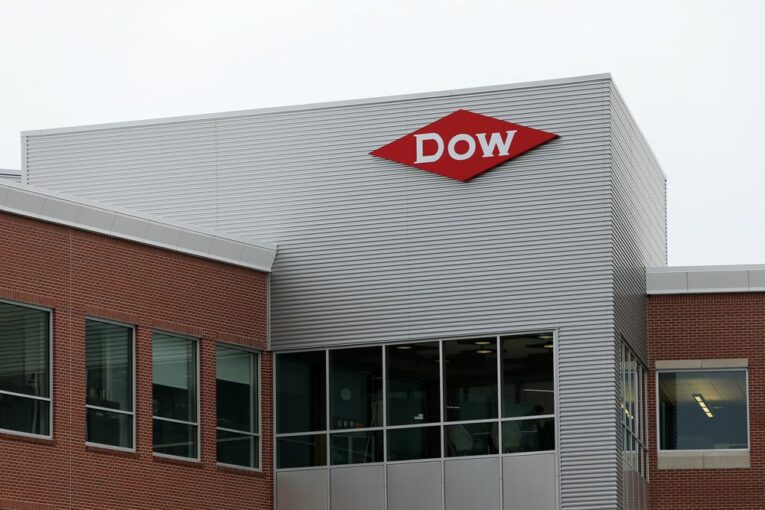
CALGARY — Dow Chemical Co. plans to triple the size of an Alberta petrochemical plant and transition the facility to net-zero emissions in a major project that experts believe will cost upwards of $10 billion, marking the biggest capital investment in the province in 15 years.
Dow on Wednesday announced it planned to build a 1.8-million-tonne per-year ethane cracker at its existing Fort Saskatchewan petrochemical complex near Edmonton and also triple the facility’s ethylene and polyethylene production.
At the same time, the Midland, Mich.-based company intends to retrofit the natural-gas-to-plastics complex to make it the world’s first net-zero carbon emissions petrochemical plant by capturing the facility’s gasses and pumping them into an existing captured carbon pipeline.
“This investment builds on Dow’s strong leadership position and allows us to meet the increasing needs of customers and brand owners seeking to lower the carbon footprint of their products,” Dow chairman and chief executive Jim Fitterling said in a release.
The company’s board has yet to formally approve the project and Dow did not provide a cost estimate for the project. But experts believe it’s expected to cost between $6 billion and $10 billion, given the price tags associated with similar projects in other jurisdictions.
“They haven’t given a dollar figure, but you’re not going to build an ethane cracker and polyethylene plant for less than $6 billion, I wouldn’t think, and I would expect it’ll be significantly more,” said Bob Masterson, chief executive of the Chemistry Industry Association of Canada, which represents petrochemical companies.
“If we look at a similar facility, the Shell facility in Pennsylvania, you’re looking at a $10-billion investment for the ethylene cracker and the polyethylene production,” he said, adding that Dow’s announcement is “absolutely staggering and positive news” for Alberta.
Masterson said the last ethane cracker built in Canada was completed 20 years ago, when Dow and Nova Chemicals Corp. teamed up to build one at a plant in Joffre, Alta.
Alberta officials would not disclose any details about Dow’s expected investment, but said it represents the single-largest capital investment in the province in 15 years, meaning it would likely eclipse the $5-billion cost of Inter Pipeline Ltd.’s $5-billion Heartland propane-to-plastics petrochemical complex.
“Today’s announcement from Dow is fantastic news for Alberta’s economy. If this project proceeds, it could represent one of the largest job-creating investments in Alberta in over a decade,” Alberta Premier Jason Kenney said in the same release.
“By choosing Alberta to host the world’s first net-zero carbon emissions ethylene plant, Dow is highlighting our growing global leadership in emissions-reducing technology like carbon capture utilization and storage, and Alberta’s open for business.”
The UCP and the previous NDP government have tried to attract additional petrochemical investment through tax incentives, including a 12-per-cent rebate on capital costs, as part of an economic diversification effort away from purely upstream oil and gas investment.
Alberta’s associate minister of natural gas Dale Nally declined to say what incentives were offered to Dow for the project, but said the province has received additional submissions for petrochemical projects.
“Our goal is to take the petrochemical industry and increase it by $30 billion by 2030 and this is a giant step forward in that direction,” Nally said of Dow’s announcement.
During Dow’s investor presentation, Fitterling said Alberta “is clearly a first mover” in carbon capture and the company chose to build the project and retrofit to net zero in the province because of the existing carbon-capture infrastructure and carbon pipeline, government incentives and Canada’s carbon tax.
“In Canada right now, you have a $40-per-tonne price on carbon. It’s going to go to more than $100 per tonne in the time frame that we’re talking about this investment, and there’s an existing carbon trunk line that we’ve contracted to be able to take our CO2, so you’ve got that infrastructure in place,” Fitterling said.
He said the company supports a “market-based price” on carbon in the United States that would lead to similar investments in the U.S.
“It’s working in Europe. It’s working in Canada. We think it can work here, but we’ve got to get a little bit farther on policy,” Fitterling said.
Dow plans to spend US$1 billion per year to “decarbonize its global asset base in a phased, site-by-site approach.”
The additional ethane cracker is also expected to drive up natural gas demand in Alberta by between 200 million cubic feet per day and 400 million cf/d, said Cameron Gingrich, managing director at Calgary-based consultancy Incorrys.
“We’re sending a lot of gas out in the pipeline with a lot of ethane in the gas,” he said.
• Email: [email protected] | Twitter: geoffreymorgan
You can read more of the news on source
